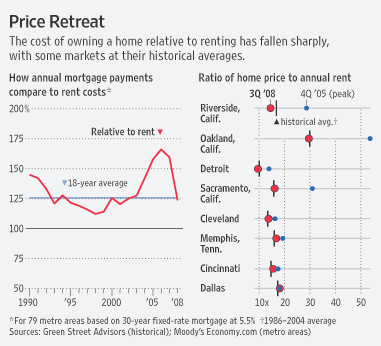Three Reasons Why Deals
Are Tougher in a Recession
What amuses me about 99% of the articles written about the housing market -- and there's been an explosion lately -- is that they're not written by active, working Realtors.
Most are simply journalists whose "beat" (area of focus) is the housing market. On a scale of 1-10, their writing skills are a "10." But in terms of first-hand experience, they're . .
not very high.
Obviously, brains and good sources can compensate immensely. But you still need to know
which sources, and how to filter what they say. And even then, there's still slippage between direct and vicarious experience.
In that vein . . . here's a first-person,
Realtor's take on the local housing market right now.
"Low-Low" Offers vs. "Lowball-Low"Generally speaking, deals are fewer and harder to come by now -- foreclosures being the
very big exception -- for three reasons.
One. Buyers and Sellers are starting farther apart.
Between the daily headlines blaring housing's woes, or seeing a neighborhood with one (or two) too many "For Sale" signs, Buyers seem to be overestimating how much leverage they have over Sellers.
As a result, Buyers' initial offers are often -- if not "lowball-low" -- just "low-low."
Needless to say, that doesn't get negotiations off to a rousing start. (Again, foreclosures being a notable exception. Banks don't get p-ssed off. They don't get . . .
anything. They just say "no" -- and take their time doing it.)
While both sides may gradually yield ground, the operative word is
"gradually" -- and the initial gap can be quite wide. As a consequence, the momentum that's needed to drive a deal through to conclusion is often lacking. (Bonus question: what deals have that quality today? Houses selling in multiple offers -- which is more common than you'd think right now).
Two. Money is tighter.
I've never really worked with clients who are cavalier about money -- people with that attitude tend to be quickly separated from theirs (just like fools). However, in flush economic times, Buyers and Sellers just seem to be more, well, "generous." And flexible.
Now, every dollar counts. Even little issues that are routinely disposed of in easier times can threaten to torpedo deals now.
Three. Inventory can feel surprisingly "thin."
It sounds odd to say in a market with 30,000-plus homes for sale, but I've heard more than one agent working with Buyers now say -- and have experienced it myself -- that it seems like there's a ton of inventory . . .
until you have a client actually looking for something.
Then . . it's nowhere to be found (sort of the housing market's equivalent of Bruce Springsteen's song, "57 Channels (And Nothin' On)."
Realtors vs. "Laymen"No doubt one reason for that is that discretionary Sellers -- people who can afford to wait --
are waiting, until perceived conditions improve (as I've written previously, those perceptions can be very wrong --
See, "
Now You See it . . .Now You Don't").
But it's also true that once a home has been on the market for awhile, Buyers tend to look for flaws. (Note to Sellers: the pendulum swings from overlooking flaws to zeroing in on them as a direct function of time on the market.) And market time
is appreciably higher in a soft, slow market.
So the same house that everyone would have "oohed and ahhed" over when it first hit the market around Labor Day is chopped liver in late Feb. (and now overpriced, given the drop in the market last Fall).
While Realtors are much less susceptible to this phenomenon than "laymen," they're still human.













